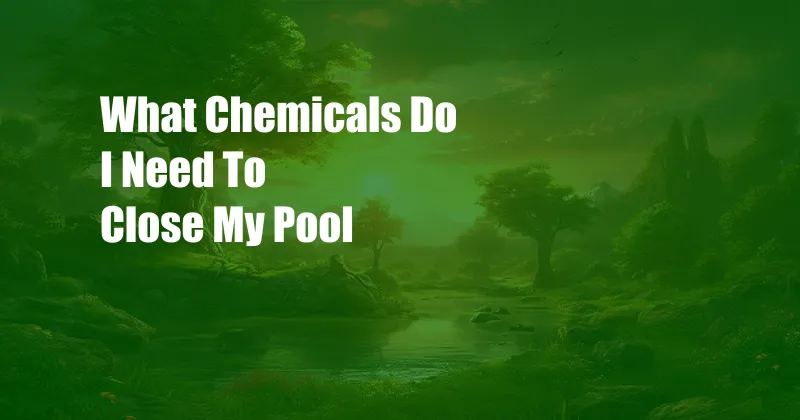
What Chemicals Do I Need to Close My Pool?
Introduction
As the season changes and the water turns cold, it’s time to prepare your pool for the winter months. One of the most important steps in this process is closing your pool properly to prevent damage and keep it in pristine condition for next season. The key to a successful pool closing lies in using the right chemicals, and this guide will walk you through everything you need to know.
Understanding Pool Chemicals
Pool chemicals play a crucial role in maintaining the cleanliness and health of your pool water. They work to kill bacteria, prevent algae growth, adjust pH levels, and keep the water clear. When closing your pool, you’ll need to use specific chemicals to ensure that the water remains balanced and protected during the off-season.
Chlorine or Bromine
Chlorine or bromine is the primary sanitizer used in pools to kill bacteria and other microorganisms. When closing your pool, it’s important to ensure that you have a sufficient level of sanitizer in the water, typically around 2 to 4 ppm. This will prevent the growth of algae and bacteria during the winter months.
pH Balancer
The pH level of your pool water measures its acidity or alkalinity. It should always be between 7.2 and 7.8, as unbalanced pH levels can lead to corrosion or scale buildup. When closing your pool, adjust the pH to around 7.4 to prevent damage.
Alkalinity
Alkalinity refers to the water’s ability to neutralize acids and maintain a stable pH level. The ideal alkalinity range for a pool is between 80 and 120 ppm. Adjust the alkalinity if necessary when closing your pool to ensure that the water remains balanced.
Stabilizer
Stabilizer helps protect chlorine from breaking down in sunlight, especially in outdoor pools. When closing your pool, increase the stabilizer level to around 40 to 60 ppm to prevent chlorine loss during the winter.
Winterizing Agent
A winterizing agent, also known as a pool antifreeze, is a special chemical that helps prevent freezing and damage to your pool equipment during the winter months. It lowers the water’s freezing point, reducing the risk of cracked pipes or damaged pumps.
Application Instructions
Once you have gathered all the necessary chemicals, carefully follow the instructions on the product labels for proper application. Generally, you’ll need to dissolve the chemicals in a bucket of water before adding them to the pool. Use a pool test kit to monitor the chemical levels and adjust them as needed.
Expert Advice
- Test your water regularly: Use a pool test kit to monitor the chemical levels throughout the closing process and make necessary adjustments.
- Cover your pool: Place a heavy-duty pool cover over the water to prevent debris and sunlight from entering.
- Clean the pool: Remove all leaves, debris, and dirt from the pool before adding chemicals to ensure that they work effectively.
- Run the pump regularly: Keep the pool pump running for short periods during the winter to prevent freezing and promote water circulation.
- Check the chemicals periodically: Monitor the chemical levels every few weeks during the winter to ensure that they remain balanced.
FAQ
- What is the ideal time to close my pool? The best time to close your pool is when the water temperature consistently stays below 60 degrees Fahrenheit.
- Can I use chlorine tablets to close my pool? While chlorine tablets can be used for regular pool maintenance, it’s not recommended to use them for closing your pool. They can create a high level of chlorine in the water, which can damage pool equipment.
- How long does it take to close a pool? Closing a pool typically takes a few hours to complete, depending on the size of the pool and the number of chemicals needed.
- What is the best way to store pool chemicals? Store pool chemicals in a cool, dry place, away from heat and sunlight. Keep them out of reach of children and pets.
Conclusion
By following these guidelines and using the right chemicals, you can successfully close your pool for the winter and protect it from damage. Remember to monitor the chemical levels regularly throughout the winter and make adjustments as needed. With proper care and maintenance, your pool will be ready to enjoy again when the warm weather returns.
Are you interested in learning more about pool chemicals and the best practices for closing your pool? Let us know in the comments below!